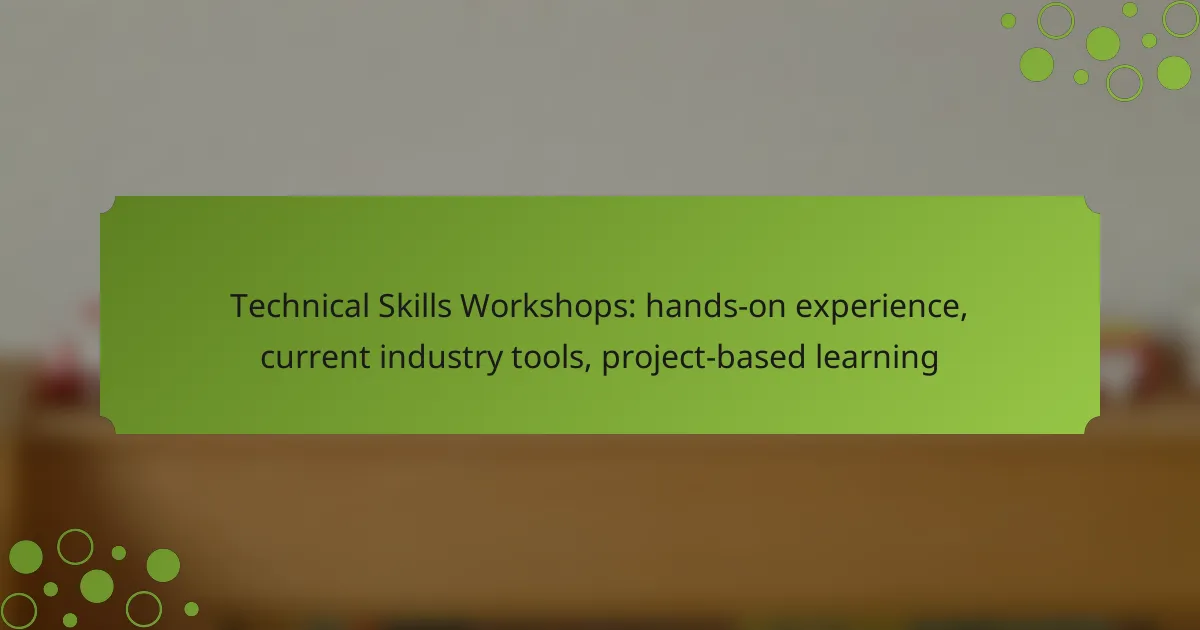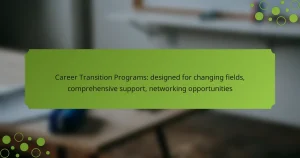
Technical skills workshops offer participants invaluable hands-on experience by immersing them in practical applications of their learning. By utilizing current industry tools, these workshops facilitate project-based learning that enhances skill retention and relevance, preparing learners for real-world challenges in fields such as software development, data analysis, and design.

How do technical skills workshops enhance hands-on experience?
Technical skills workshops significantly enhance hands-on experience by providing participants with practical, real-world applications of their learning. These workshops focus on using current industry tools and methodologies, allowing learners to engage directly with the material in a structured environment.
Interactive learning environments
Interactive learning environments foster collaboration and engagement among participants. Workshops often incorporate group activities, discussions, and peer-to-peer learning, which can enhance understanding and retention of technical skills. This dynamic setting encourages participants to ask questions and share insights, making the learning process more effective.
Utilizing tools like simulations or collaborative software can further enrich these environments, enabling learners to practice skills in a safe space before applying them in real-world scenarios.
Real-world project applications
Real-world project applications are a cornerstone of technical skills workshops, allowing participants to work on projects that mimic actual industry challenges. This hands-on approach helps learners understand how to apply their skills in practical situations, bridging the gap between theory and practice.
For example, a workshop might involve developing a small software application or creating a marketing campaign, providing participants with tangible outcomes that they can showcase in their portfolios. Such projects often reflect current trends and technologies, ensuring relevance in the job market.
Immediate feedback from instructors
Immediate feedback from instructors is crucial in technical skills workshops, as it allows participants to quickly identify and correct mistakes. Instructors can provide tailored guidance based on individual performance, helping learners to refine their skills effectively.
This real-time interaction can take the form of one-on-one coaching, group critiques, or even live demonstrations. Participants benefit from understanding their strengths and areas for improvement, which accelerates their learning process and boosts confidence in their abilities.

Which current industry tools are used in workshops?
Workshops often utilize a variety of current industry tools to provide hands-on experience and practical learning. These tools are essential for developing technical skills that align with real-world applications across software development, data analysis, and design.
Software development tools like GitHub
GitHub is a widely used platform for version control and collaboration in software development. It allows teams to manage code changes, track issues, and collaborate on projects efficiently. Familiarity with GitHub is crucial for developers, as it is a standard tool in many tech environments.
When participating in workshops, learners should focus on understanding Git commands, branching strategies, and pull requests. A common pitfall is neglecting to read documentation; taking the time to explore GitHub’s resources can significantly enhance one’s proficiency.
Data analysis tools like Tableau
Tableau is a powerful data visualization tool that helps users analyze and present data effectively. It enables the creation of interactive dashboards, making it easier to derive insights from complex datasets. Workshops often emphasize hands-on projects that require participants to manipulate data and visualize trends using Tableau.
To maximize learning, participants should practice connecting Tableau to various data sources and experiment with different visualization types. Avoiding overly complex visualizations at first can help in grasping the fundamentals before tackling advanced features.
Design software like Adobe Creative Cloud
Adobe Creative Cloud encompasses a suite of design tools, including Photoshop, Illustrator, and InDesign, essential for graphic design and multimedia projects. Workshops typically focus on practical applications, allowing participants to create real-world design projects using these tools.
When learning Adobe software, it’s beneficial to start with foundational skills, such as understanding layers in Photoshop or vector graphics in Illustrator. Regular practice and exploring online tutorials can help avoid frustration and accelerate skill development.

What are the benefits of project-based learning?
Project-based learning offers hands-on experience that enhances understanding and retention of skills. It allows participants to engage with current industry tools while working on real-world projects, making the learning process more relevant and practical.
Improved problem-solving skills
Project-based learning cultivates improved problem-solving skills by placing learners in scenarios that require critical thinking and creativity. Participants often encounter challenges that mimic real-life situations, prompting them to analyze problems and devise effective solutions.
For instance, when working on a software development project, learners may need to troubleshoot bugs or optimize performance, which sharpens their analytical abilities. This experiential approach helps develop a mindset geared towards finding innovative solutions.
Enhanced collaboration and teamwork
Engaging in project-based learning fosters enhanced collaboration and teamwork among participants. Working in groups encourages communication and the sharing of diverse perspectives, which are essential in many professional environments.
For example, a group tasked with creating a marketing campaign must coordinate their efforts, assign roles, and integrate ideas, simulating the dynamics of a real workplace. This experience not only builds interpersonal skills but also prepares learners for collaborative projects in their careers.
Portfolio development for job readiness
Project-based learning contributes to portfolio development, which is crucial for job readiness. By completing tangible projects, participants can showcase their skills and experiences to potential employers, demonstrating their practical knowledge and capabilities.
Creating a portfolio that includes projects, such as a website or a data analysis report, allows learners to present concrete evidence of their abilities. This can significantly enhance their attractiveness to employers, especially in competitive job markets where practical experience is highly valued.

What prerequisites are needed for technical skills workshops?
Technical skills workshops typically require participants to have a foundational understanding of computers and relevant software. These prerequisites ensure that attendees can engage effectively with the hands-on activities and project-based learning involved in the workshops.
Basic computer literacy
Basic computer literacy is essential for anyone looking to participate in technical skills workshops. This includes familiarity with operating systems, file management, and general navigation of software applications.
Participants should be comfortable using a keyboard and mouse, as well as performing basic tasks such as creating, saving, and organizing files. A good starting point is ensuring proficiency in common applications like word processors and spreadsheets.
Familiarity with programming concepts
A foundational understanding of programming concepts is crucial for workshops focused on software development or technical skills. This includes knowledge of basic programming terminology, such as variables, loops, and functions.
While not all workshops require prior coding experience, having a grasp of these concepts can significantly enhance learning. Resources like online tutorials or introductory courses can help build this knowledge before attending a workshop.
Specific software knowledge
Many technical skills workshops focus on specific software tools relevant to the industry. Familiarity with these tools can vary, but participants should ideally have some experience using them.
For example, if a workshop emphasizes a particular programming language or software suite, having prior exposure can facilitate a smoother learning experience. Checking the workshop’s prerequisites and recommended tools beforehand can help attendees prepare effectively.

How to choose the right technical skills workshop?
Selecting the right technical skills workshop involves assessing the course content, the qualifications of the instructors, and the format and duration of the workshop. These factors will help ensure that the workshop meets your learning objectives and provides practical, hands-on experience with current industry tools.
Evaluate course content and outcomes
When evaluating course content, look for workshops that offer hands-on experience with relevant tools and technologies. Check if the curriculum includes project-based learning, as this approach enhances retention and application of skills.
Consider the expected outcomes of the workshop. Are participants expected to complete a project or gain specific certifications? Clear outcomes can help you gauge the workshop’s effectiveness and relevance to your career goals.
Check instructor qualifications
The qualifications of the instructors can significantly impact the quality of the workshop. Look for instructors with industry experience and a proven track record in teaching technical skills. Their real-world insights can provide valuable context to the learning material.
Additionally, check for any certifications or accolades the instructors may have. This can indicate their expertise and commitment to staying updated with current industry trends and tools.
Consider workshop format and duration
Workshop format can vary widely, from in-person sessions to online classes. Determine which format suits your learning style best. In-person workshops may offer more direct interaction, while online options can provide flexibility and convenience.
Duration is also a key factor. Short workshops may provide a quick overview, while longer sessions can offer in-depth training. Assess how much time you can commit and choose a workshop that aligns with your schedule and learning needs.

What are the pricing models for online technical skills workshops?
Online technical skills workshops typically utilize two main pricing models: subscription-based access and one-time course fees. Each model offers distinct advantages and considerations depending on your learning preferences and budget.
Subscription-based access
Subscription-based access allows learners to pay a recurring fee, often monthly or annually, for unlimited access to a library of courses and resources. This model is beneficial for those who plan to take multiple workshops over time, as it can lead to cost savings compared to purchasing individual courses.
When considering a subscription, evaluate the breadth of content available and the frequency of new course additions. Many platforms offer trial periods, so take advantage of these to assess the quality and relevance of the workshops before committing.
One-time course fees
One-time course fees require learners to pay a set amount for each individual workshop. This model is ideal for those who want to focus on specific skills without the commitment of a subscription. Prices for one-time courses can vary widely, typically ranging from around $50 to several hundred dollars depending on the course’s depth and the instructor’s expertise.
Before enrolling, check if the course includes additional resources like downloadable materials or access to a community forum. Also, be aware of refund policies in case the course does not meet your expectations. This approach allows for targeted learning without ongoing financial obligations.


